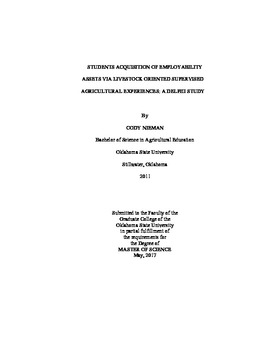| dc.description.abstract | Challenging budgets require school administrators to evaluate all services and programs provided by public schools. School-based agricultural education programs are not immune to an administrators review, to that end, it is important for agricultural education instructors to be viewed as complementary to the overall mission of the school. School-based agricultural education in Oklahoma places an emphasis on entrepreneurial livestock supervised agricultural education (SAE) programs, this emphasis requires the investment of teacher time both in and out of the classroom. To help stakeholders better understand the benefits of these investments, this research sought to identify evidence of student acquisition of employability assets through student participation in entrepreneurial livestock SAEs. The acquisition of employability assets is important, twenty-one million people are employed in agricultural or agriculturally related careers, including production, retail, wholesale, and marketing (American Farm Bureau Federation, 2016; Rusk, Martin, Talbert, & Balshweid, 2002). The agriculture industry provides over 300 career opportunities in the areas of science, business and technology, with ten percent of U.S. workers employed in agriculture. Unfortunately, the skill gap reflecting employability assets is wider than ever, today�s workforce is four generations removed from the agricultural sector decreasing the pool of workers possessing skills and knowledge in agricultural areas (Leising & Zilbert, 1994). Supervised agricultural experience programs provide students experiential learning opportunities that provide them with basic employability skills for entry-level positions (National FFA Organization, 2016). Therefore, it is essential for secondary school administrators, agriculture education instructors, students and potential employers to recognize the potential for technical and non-technical skills to be gained when students are involved in supervised agricultural experience programs. This research highlights the acquisition of employability skills via supervised agricultural experience programs as reported by agricultural education teachers in Oklahoma. | |
